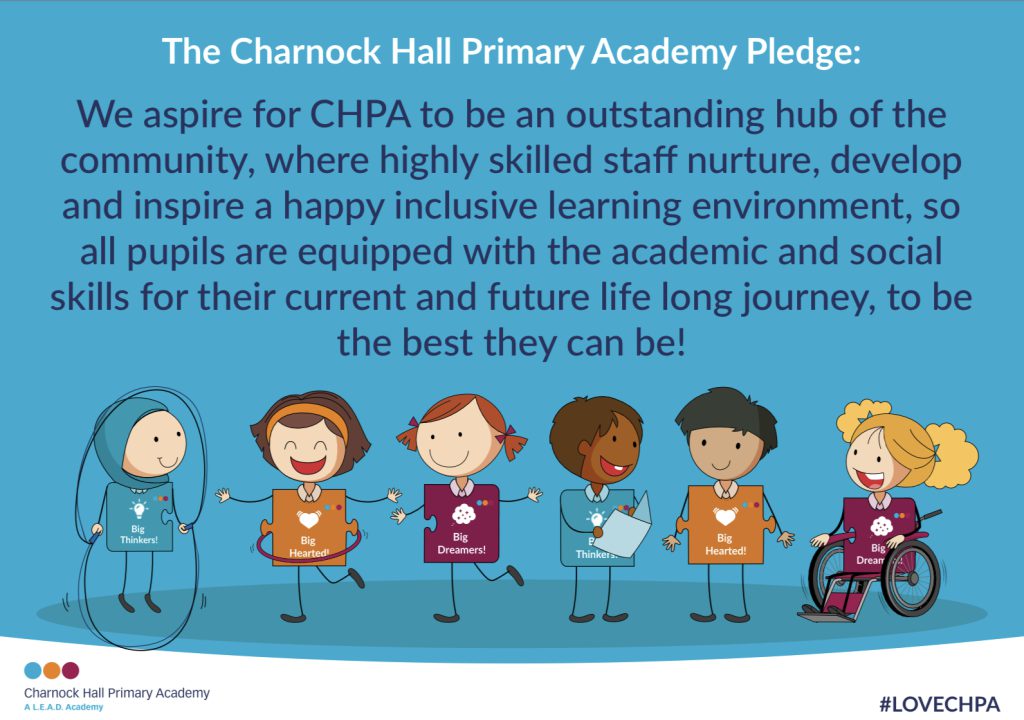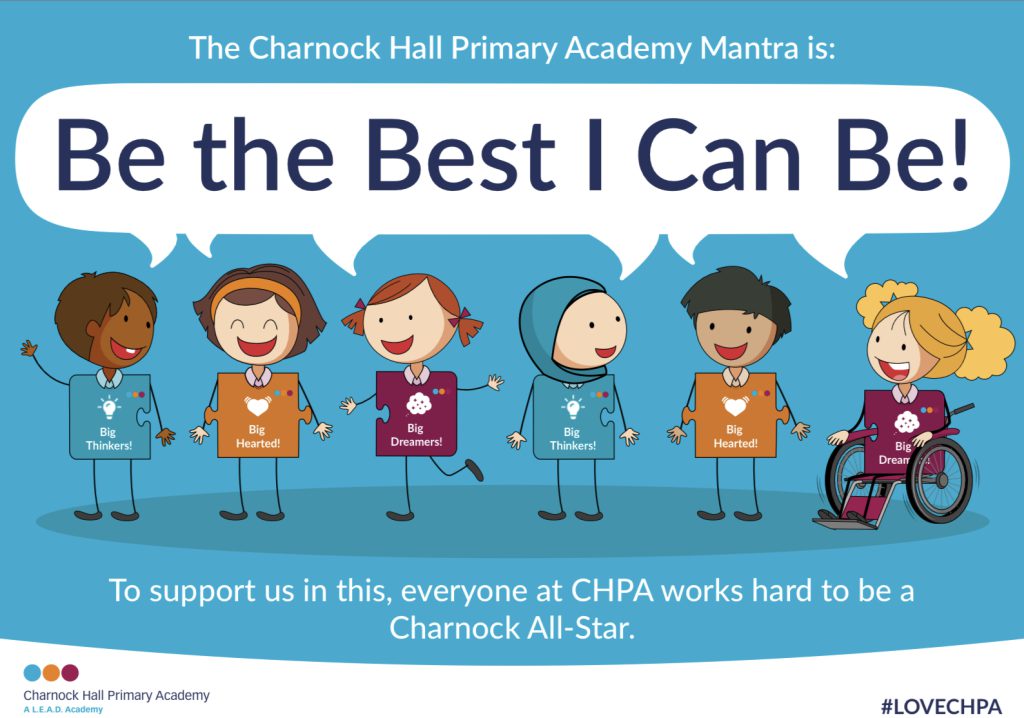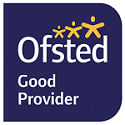
Special Educational Needs & Disabilities Co-ordinator (SENDCo): MRS L Fotheringham
EMAIL: [email protected]
TELEPHONE: 01142396083
At Charnock Hall, we endeavour to meet pupils individual needs, whatever they are. We provide for all types of SEN, of which the broad areas are:
- Communication and interaction
- Cognition and learning
- Social emotional and mental health difficulties
- Sensory and/or physical needs
ADMISSION OF CHILDREN WITH SEND
The Local Authority admits pupils to the school according to its own admissions policy.
Children who have Education, Health & Care plans which name Charnock Hall Primary Academy are given priority.
ASSESSMENT
All children are assessed on entry. We use the Development Matters – Ages and Stages to assess children on entry to the Early Years Foundation Stage and we use a variety of assessment strategies to support teacher judgements in Key Stage 1 and 2. These assessments tell us how well a pupil is attaining according to age-related expectations. If a pupil is attaining below their age related expectation in any area, then the first thing that will happen is that their teacher will provide activities which are at the right level for them (this is called differentiation). Progress will then be monitored by the class teacher. Most pupils will make progress if the work provided by their teacher is matched to their needs. Additionally, they may also receive additional support from another teacher or teaching assistant (this is called quality first teaching). Some have the opportunity to access a catch-up (intervention) programme for a limited period to aid their development. If a pupil isn’t making progress, or isn’t making enough progress, then the teacher will consult the school’s SEND co-ordinator (SENDco). The SENDCO may advise the teacher to carry out some further assessments, such as a reading test, or the SENDCO may advise referring the child to a more specialist professional, such as our external learning support teacher or the speech and language service. Sometimes we involve health or social care, if we think that would be helpful. We then put more specialised plans in place to meet the needs of the pupil. This is when we say that a child has Special Educational Needs – a child is receiving provision different from or additional to that normally available to pupils of the same age. For one or two pupils an Education, Health and Care needs assessment will be appropriate. This is a statutory process about which parents will be fully informed.
INVOLVING PARENTS AND CARERS
EVERYONE:
- is asked about their child’s needs when their child starts at Charnock Hall
- has the opportunity to come into school at the end of the day
- can telephone or email the school with any concerns or queries
- who uses the breakfast or after school club can leave messages with the club or office staff
- is invited to parents and carers meetings in the Autumn and Spring and is invited to a celebration of work afternoon in the Summer term
- receives an annual report
- is invited to school events
SOME PARENTS:
- whose child is receiving extra support in class are informed about it at Parents’ evening
- whose child is chosen to go on a catch-up programme will know because the teacher will speak with them either at Parents’ evening or during a convenient time for both or a letter is sent home
- may notice things at home that we do not observe at school and it’s really important that they tell
- their child’s teacher about these things
A FEW PARENTS:
- whose child needs more specialised support, because they have SEND, will be invited to have planning meetings in school with the SENDCO, class teacher and where appropriate any specialist staff involved, to decide how best to meet their child’s needs. These meetings happen at least once a term and more often, if needed
Children who are looked after by the local authority will have planning meetings as a matter of course, these may be more frequent if they have SEND.
INVOLVING PUPILS WHO HAVE SEND
Before each planning meeting the class teacher will talk to each child with SEND and find out their views. They might ask about what the child finds easy or hard, who the child goes to for help, what the child would like help with next, what the child likes doing etc. Every day, all the staff who are working with children with SEND are observing them and listening to them. They are alert to children’s feelings and report any changes to the SENDco and the parents.
PLANNING MEETINGS (WITH PARENTS)
FIRST PLANNING MEETING:
- At the first meeting everyone in attendance, including the parents, will contribute to an assessment of the child’s needs. The views of the child, which will have been gathered by a member of staff, will be included.
- Next, everyone agrees on a plan for how best to meet the child’s needs. This will include agreed actions for everyone (including parents), the expected outcomes from the actions and by when they should happen.
- After that everyone goes to do the things that have been agreed.
SECOND PLANNING MEETING:
- This starts with a review of the plan to see how successful it was.
- The assessment is then reviewed to see if anything needs to be added or changed
- A new plan is agreed
- Everyone leaves to do what has been agreed.
Planning meetings are then repeated until either the child leaves school, or meetings are no longer needed.
TRANSITION TO THE BIRLEY ACADEMY
The SENDco from Birley Academy attends the last planning meeting at Charnock Hall before the pupil leaves, to plan everything that needs to happen and ensure a successful transition to the secondary school. If a pupil is moving on to another secondary school, Charnock Hall’s SENDco will contact their SENDCo to arrange a meeting.
POSSIBLE PLANS FOR CHILDREN WITH SEND
At Charnock Hall we are very flexible and will do our best to put in place whatever a child needs, so they are not treated less favourably than other pupils. This could include:
- A sensory approach to learning
- More practical activities
- Smaller learning steps
- Extra help/supervision from a member of staff
- Small group or one to one work where appropriate
- Different resources or facilities
- Visual timetable
- Work station
All staff are experienced and trained in meeting pupils SEND needs. When needed, specialist training is arranged so that a child’s plan can be delivered.
A WHOLE SCHOOL APPROACH
At Charnock Hall we have a whole school approach to SEND, it is part of our strategic planning every year. The progress of pupils with SEND is monitored and evaluated; it is on our school development plan and a part of staff performance management.
AS PART OF OUR WHOLE SCHOOL APPROACH:
- We make sure that adjustments are in place so that children with SEND can access all the activities available in school. We may provide additional resources or support, or we may adapt the activity to make it accessible.
- We provide high quality support for improving everyone’s emotional and social development, through the PSHE curriculum and where appropriate additional support from Mrs Jenkinson our Pupil Support Officer.
- We have a rigorous reporting and monitoring system for bullying and investigate any complaint seriously.
ACCESS FACILITIES
The Infant (EYFS & KS1) and Junior (KS2) sections of the school are separated by stairs (no lift). The Junior building is quite spread out with toilet facilities being located at the start of a long corridor. We have one accessible toilet with shower. Visual timetables are used where appropriate, dependent upon a child’s needs. Within school we have a range of equipment available including visual overlays, where it has been recommended by a specialist, and educational resources, for example, Numicon. For more specific needs equipment is often provided by outside agencies when recommended e.g. iPad for visual impairment, writing slopes for dyspraxia, classroom laptops etc.
COMPLAINTS
Should parents of children with SEND have any complaints about the provision for their children, they should contact either the SENDco or the Headteacher. If their complaint is not resolved then they should follow the school complaints procedure, available from the school office and the school website.
THE LOCAL OFFER
The CHPA contribution to the local offer can be found on the Sheffield Directory.
Please note that paper copies of this information are available on request from the school office.


